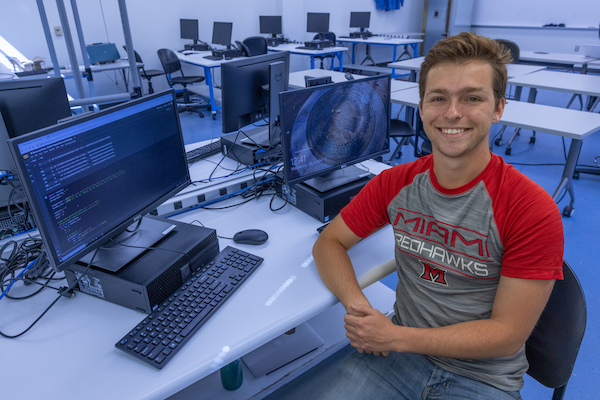Meet the Miami CEC students and faculty breaking new ground in generative AI, deep learning
In the college town of Oxford, Ohio, Miami University CEC professors are working with students to push the frontiers of generative AI research, producing novel real-world applications.

Meet the Miami CEC students and faculty breaking new ground in generative AI, deep learning
At Miami University’s College of Engineering and Computing (CEC), professors are incorporating their research into real-world learning opportunities for undergraduate and graduate students. Together at Miami CEC’s department of Computer Science and Software Engineering, faculty and students are already at work developing new algorithms, refining existing methods, and enabling novel applications for generative AI and deep learning technology. With faculty who are technical leaders in this rapidly growing field, along with investment in hardware that enables deep learning, particularly GPUs (the cards on which computations are performed), Miami CEC is uniquely positioned to develop the next generation of generative AI experts.
Below are just a few stories of how students and faculty are working together on generative AI projects at Miami University CEC.
For example…
- Have you ever seen someone with an amazing haircut and thought, “I wonder how that would look on me?” Thanks to the generative AI expertise of Miami CEC Professor John Femiani, you can. Professor Femiani’s research demonstrates how using a generative network can automatically copy the hairstyle of one person onto the photo of another…and that’s just the beginning.
See Professor Femiani’s work in action in this 2-minute video.
- Meanwhile, Miami University CEC Associate Professor Philippe Giabbanelli, working with Miami graduate student Anish Shrestha ’23, has used generative AI to improve accessibility for complex diagrams. Their work using GPT-3 to make complex models and diagrams more accessible will be presented at this December’s Winter Simulation Conference, the premier conference on simulation.
- Curious how professors and students work in the field of deep learning? Professor John Femiani has worked with student Siddhant Karki ’26 on a generative model that could turn an image into its expected sound, such as the sound of a crying infant. Professor Giabbanelli and student Ryan Schuerkamp ’24 have worked on projects involving a deep neural network for the Special Collection postcards at Miami's King Library. Instead of manually annotating all postcards, they developed a model that can identify individuals in historical postcards, including social cues like gender. This automatic tagging of a large collection then enables researchers to investigate questions related to the historical portrayal of gender.
- Miami CEC Assistant Professor Xianglong Feng has worked with undergraduate students using deep learning to create AI-based cheating detection tools in video games. Working with students, Professor Feng is also currently working on a project where he uses large language models (LLMs) to train an “advisor bot,” which can provide the basis of answers to common advising questions automatically, and thus focus the advisor's time on more important details.
- Miami University CEC undergraduate and graduate students such as Kyle Mielke ’22, Tuong Anh Nguyen ’22 and Tyler Gandee ’24 have also been trained on large language models (LLMs) to generate automatic explanations and text paragraphs with coherent flow, under the guidance of Professor Giabbanelli. "I have to give a shout out to Professor Giabbanelli," said Tyler Gandee, a graduate student studying computer science. "He's really been guiding me through this whole process. It was scary going into research, but now I really feel like I have a good sense of direction as to where to go by the time I graduate."
At Miami CEC, having technical leaders as faculty has allowed students to jump into projects that are rigorous and reputable, even helping to write and present papers at conferences alongside their professors. “Generative AI is part of AI and machine learning, and is covered already in classes,” said Professor Giabbanelli. “Miami’s department of Computer Science and Software Engineering is the natural place to learn about AI, including generative AI.”